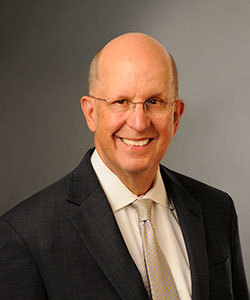A Q&A Session With Shelby R. Grubbs, J.D., FCIArb
Shelby Grubbs joined JAMS in 2020 with more than 40 years of complex commercial litigation experience involving business and commercial, construction, intellectual property, securities, product liability and insurance disputes. We spoke with Shelby Grubbs about some of his biggest cases, his ADR approach and the professional accomplishments he is most proud of.
Tell us about your legal career prior to joining JAMS.
I began my practice in Chattanooga, Tennessee, where I worked across a broad spectrum: antitrust, construction, employment, intellectual property, insurance. I also helped Tennessee courts institutionalize ADR after being appointed by the Tennessee Supreme Court to chair its ADR Commission. I then moved to Atlanta to help my firm launch an office. In Atlanta, I became more involved in international matters, including heading up the Litigation, Arbitration & Dispute Resolution Section of the World Law Group, editing a book on international civil procedure for Kluwer, helping establish the Atlanta International Arbitration Society and serving as the founding CEO of the Atlanta Center for International Arbitration and Mediation.
What are some of your career highlights?
In the 1980s, I was lead counsel in several multi-party cases involving limited partnerships to mine coal. In the 1990s, I led a team in cases with parallel proceedings in the U.S. and the U.K. involving a prominent retail brand, and I acted as special master in a $1-billion Medicare case. In the 2000s, I represented a Big Four accounting firm and a Fortune 100 consumer products company in nationwide class and collective action litigations, and I acted for a plaintiff class in a real estate development dispute. In the 2010s, I continued my work with international disputes; taught at Emory, Vanderbilt and Georgia State University; and transitioned to work as a full-time neutral.
How would you describe your ADR style?
As a neutral, I aspire to deliver a professional service in a thoughtful and timely way while remaining sensitive to the parties and counsel. As a result, my style shifts in accordance with the desires and expectations of the parties. In arbitration, I give the parties latitude to modify the procedure to meet the needs of their dispute. However, without insisting on rigorous formality, I am intentional about maintaining a professional demeanor, and I insist on courtesy to and from all participants. In mediation, I am less formal and generally collaborative but can shift to be more directive when I think it’s appropriate. Whatever the process, my goal is to move every case to disposition as rapidly as possible while respecting party autonomy and making certain that all parties stay engaged in the process.
Which practice areas are you passionate about and why?
There is not a kind of case that I dislike or will refuse. I have been a neutral in a broad range of matters: general commercial, construction, consumer credit, corporate governance, employment, engineering, franchise, maritime and software licensing matters, to name a few. I enjoy international matters and like to keep international cases in my overall workload.
Who influenced your legal career or had an impact on the direction you’ve taken in your career?
Thornton Strang, my original boss, taught me to never stop trying to be better and to remain humble. Martha Craig Daughtrey, then an associate justice on the Tennessee Supreme Court and now a senior judge on the Sixth Circuit Court of Appeals, taught me the value of service to the profession. Mike Cody, one-time lawyer for Martin Luther King and Tennessee attorney general, taught me to get and stay organized. A former Fortune 100 general counsel I worked with closely taught me coaching at a high level and how to stay in charge while also staying above the fray.
Which professional accomplishment are you most proud of?
I benefited greatly from the wonderful mentors I had throughout my career. My proudest moments are when I see younger lawyers I have mentored achieve professional success. Among my former mentees are a federal judge, a state appellate judge, a member of the executive committee of an AmLaw 50 firm, the CEO of an international charity and, of course, partners in the firm where I practiced. I find that homogenous groups are weaker, less durable, and often exhibit less collective intelligence than diverse organizations. I have been fortunate to work in and for organizations that value diversity. Many of my mentees have been people from diverse backgrounds, and I like to think that the firms and institutions in which they are now employed are stronger because of our work together.
What advice would you give to young people interested in entering the field of law?
Be prepared to work hard, look for mentors until you find them and understand that we might always be less than what we aspire to be, but the point is to keep reaching for your goals and aspiring to be better.
Disclaimer:
This page is for general information purposes. JAMS makes no representations or warranties regarding its accuracy or completeness. Interested persons should conduct their own research regarding information on this website before deciding to use JAMS, including investigation and research of JAMS neutrals. See More

